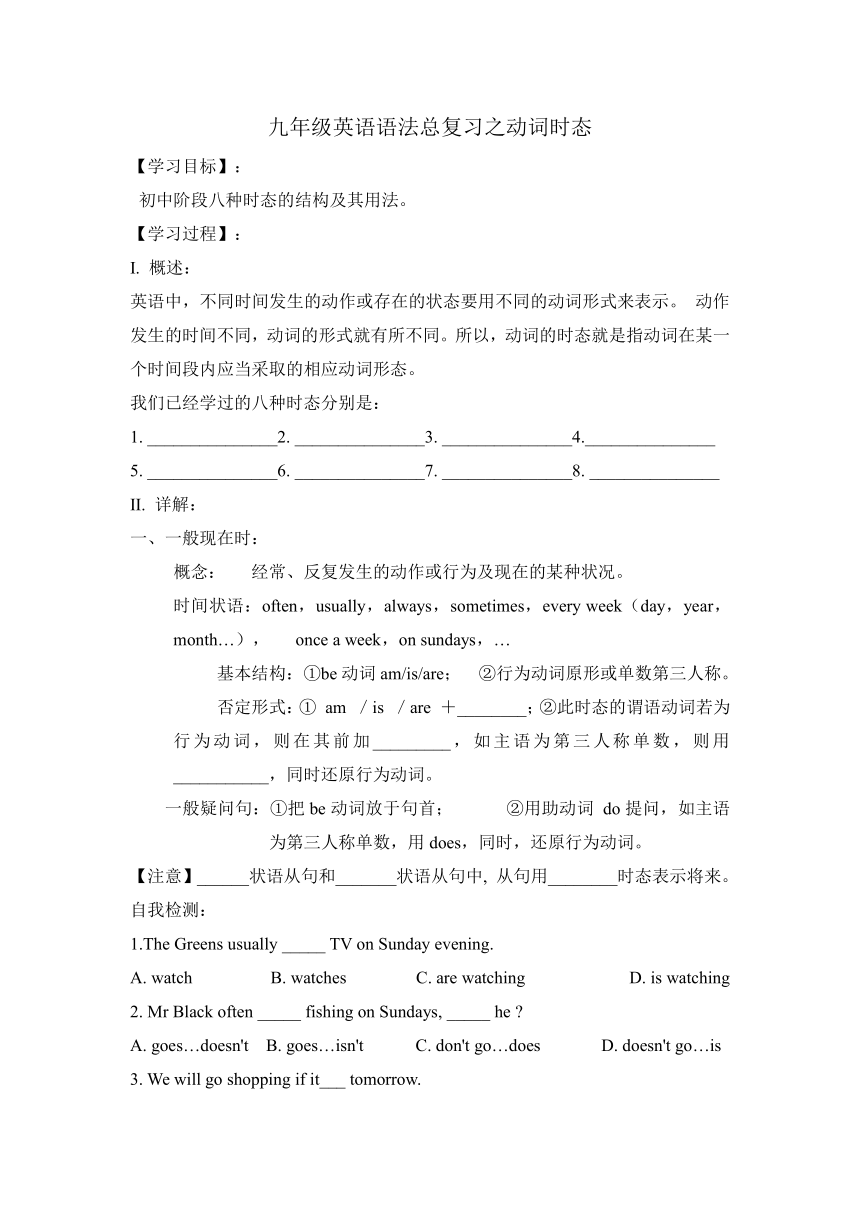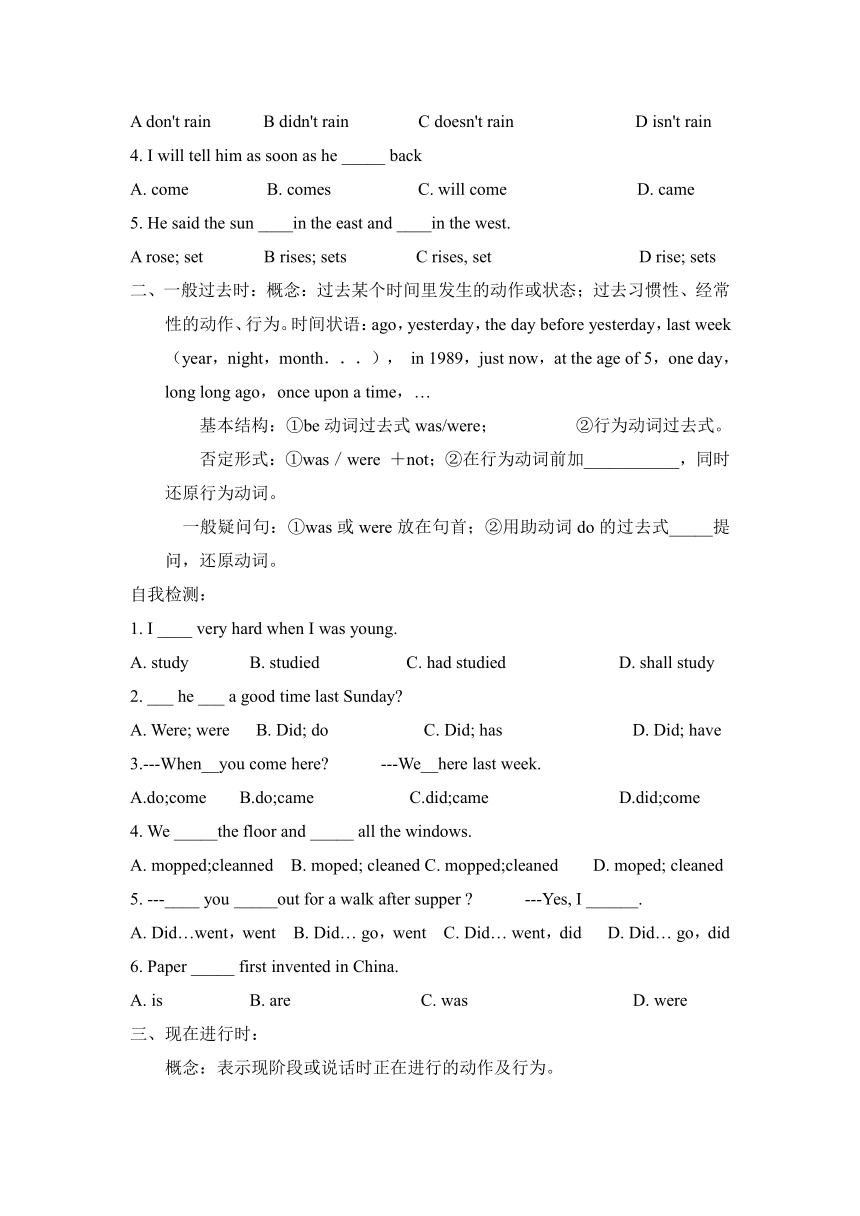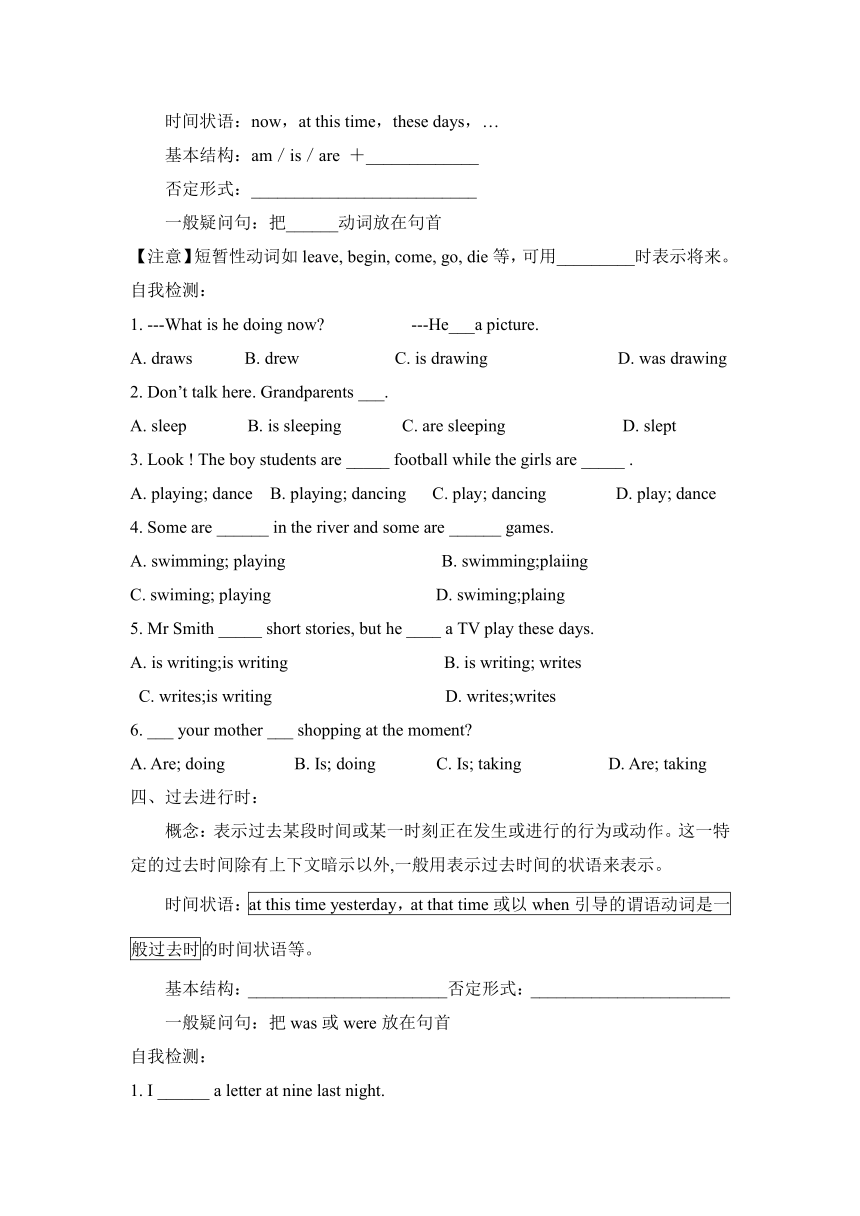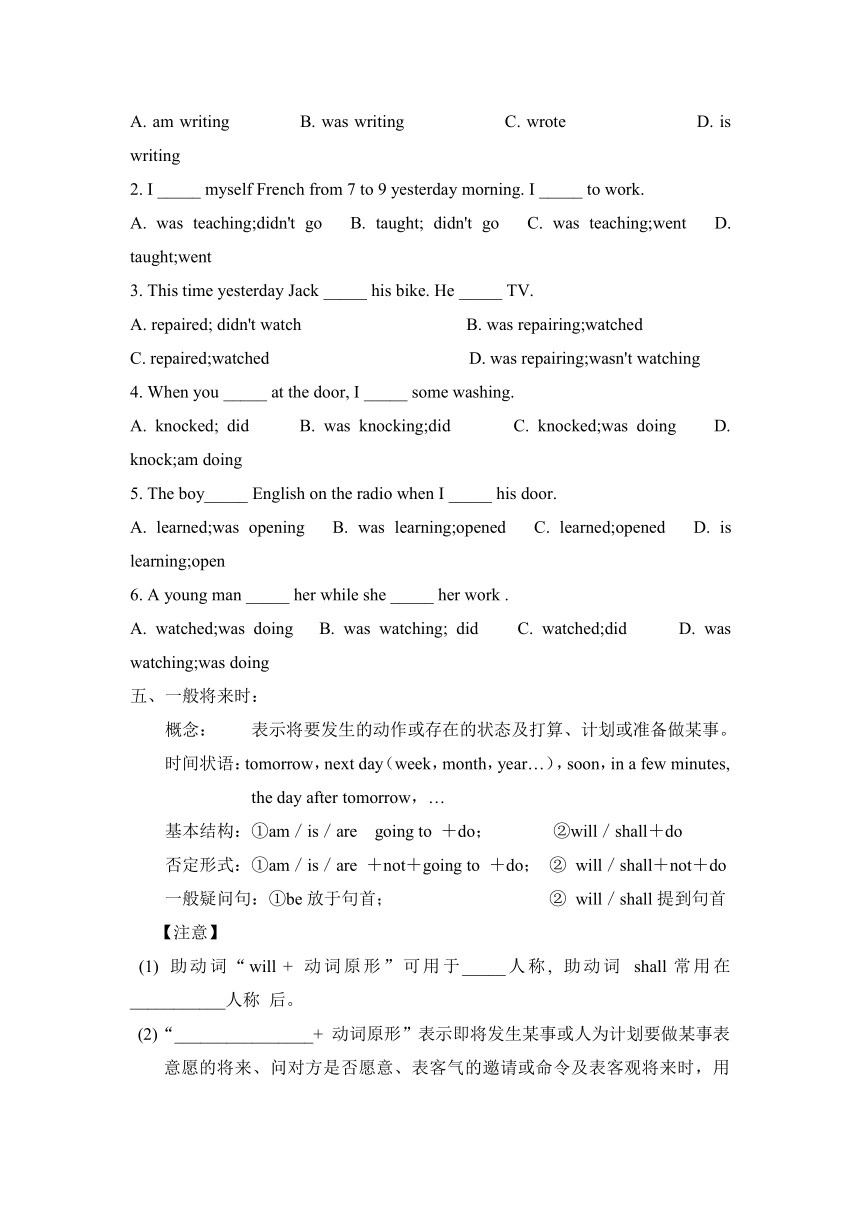九年级英语语法总复习之动词时态学案
图片预览




文档简介
九年级英语语法总复习之动词时态
【学习目标】:
初中阶段八种时态的结构及其用法。
【学习过程】:
I. 概述:
英语中,不同时间发生的动作或存在的状态要用不同的动词形式来表示。 动作发生的时间不同,动词的形式就有所不同。所以,动词的时态就是指动词在某一个时间段内应当采取的相应动词形态。
我们已经学过的八种时态分别是:
1. _______________2. _______________3. _______________4._______________
5. _______________6. _______________7. _______________8. _______________
II. 详解:
一、一般现在时:
概念: 经常、反复发生的动作或行为及现在的某种状况。
时间状语:often,usually,always,sometimes,every week(day,year,month…), once a week,on sundays,…
基本结构:①be动词am/is/are; ②行为动词原形或单数第三人称。
否定形式:① am /is /are +________;②此时态的谓语动词若为行为动词,则在其前加_________,如主语为第三人称单数,则用___________,同时还原行为动词。
一般疑问句:①把be动词放于句首; ②用助动词 do提问,如主语为第三人称单数,用does,同时,还原行为动词。
【注意】______状语从句和_______状语从句中, 从句用________时态表示将来。
自我检测:
1.The Greens usually _____ TV on Sunday evening.
A. watch B. watches C. are watching D. is watching
2. Mr Black often _____ fishing on Sundays, _____ he
A. goes…doesn't B. goes…isn't C. don't go…does D. doesn't go…is
3. We will go shopping if it___ tomorrow.
A don't rain B didn't rain C doesn't rain D isn't rain
4. I will tell him as soon as he _____ back
A. come B. comes C. will come D. came
5. He said the sun ____in the east and ____in the west.
A rose; set B rises; sets C rises, set D rise; sets
二、一般过去时:概念:过去某个时间里发生的动作或状态;过去习惯性、经常性的动作、行为。时间状语:ago,yesterday,the day before yesterday,last week(year,night,month...), in 1989,just now,at the age of 5,one day,long long ago,once upon a time,…
基本结构:①be动词过去式was/were; ②行为动词过去式。
否定形式:①was/were +not;②在行为动词前加___________,同时还原行为动词。
一般疑问句:①was或were放在句首;②用助动词do的过去式_____提问,还原动词。
自我检测:
1. I ____ very hard when I was young.
A. study B. studied C. had studied D. shall study
2. ___ he ___ a good time last Sunday
A. Were; were B. Did; do C. Did; has D. Did; have
3.---When__you come here ---We__here last week.
A.do;come B.do;came C.did;came D.did;come
4. We _____the floor and _____ all the windows.
A. mopped;cleanned B. moped; cleaned C. mopped;cleaned D. moped; cleaned
5. ---____ you _____out for a walk after supper ---Yes, I ______.
A. Did…went,went B. Did… go,went C. Did… went,did D. Did… go,did
6. Paper _____ first invented in China.
A. is B. are C. was D. were
三、现在进行时:
概念:表示现阶段或说话时正在进行的动作及行为。
时间状语:now,at this time,these days,…
基本结构:am/is/are +_____________
否定形式:__________________________
一般疑问句:把______动词放在句首
【注意】短暂性动词如leave, begin, come, go, die等,可用_________时表示将来。
自我检测:
1. ---What is he doing now ---He___a picture.
A. draws B. drew C. is drawing D. was drawing
2. Don’t talk here. Grandparents ___.
A. sleep B. is sleeping C. are sleeping D. slept
3. Look ! The boy students are _____ football while the girls are _____ .
A. playing; dance B. playing; dancing C. play; dancing D. play; dance
4. Some are ______ in the river and some are ______ games.
A. swimming; playing B. swimming;plaiing
C. swiming; playing D. swiming;plaing
5. Mr Smith _____ short stories, but he ____ a TV play these days.
A. is writing;is writing B. is writing; writes
C. writes;is writing D. writes;writes
6. ___ your mother ___ shopping at the moment
A. Are; doing B. Is; doing C. Is; taking D. Are; taking
四、过去进行时:
概念:表示过去某段时间或某一时刻正在发生或进行的行为或动作。这一特定的过去时间除有上下文暗示以外,一般用表示过去时间的状语来表示。
时间状语:at this time yesterday,at that time或以when引导的谓语动词是一般过去时的时间状语等。
基本结构:_______________________否定形式:_______________________
一般疑问句:把was或were放在句首
自我检测:
1. I ______ a letter at nine last night.
A. am writing B. was writing C. wrote D. is writing
2. I _____ myself French from 7 to 9 yesterday morning. I _____ to work.
A. was teaching;didn't go B. taught; didn't go C. was teaching;went D. taught;went
3. This time yesterday Jack _____ his bike. He _____ TV.
A. repaired; didn't watch B. was repairing;watched
C. repaired;watched D. was repairing;wasn't watching
4. When you _____ at the door, I _____ some washing.
A. knocked; did B. was knocking;did C. knocked;was doing D. knock;am doing
5. The boy_____ English on the radio when I _____ his door.
A. learned;was opening B. was learning;opened C. learned;opened D. is learning;open
6. A young man _____ her while she _____ her work .
A. watched;was doing B. was watching; did C. watched;did D. was watching;was doing
五、一般将来时:
概念: 表示将要发生的动作或存在的状态及打算、计划或准备做某事。
时间状语:tomorrow,next day(week,month,year…),soon,in a few minutes,
the day after tomorrow,…
基本结构:①am/is/are going to +do; ②will/shall+do
否定形式:①am/is/are +not+going to +do; ② will/shall+not+do
一般疑问句:①be放于句首; ② will/shall提到句首
【注意】
(1) 助动词“will + 动词原形”可用于_____人称, 助动词 shall常用在___________人称 后。
(2)“________________+ 动词原形”表示即将发生某事或人为计划要做某事表意愿的将来、问对方是否愿意、表客气的邀请或命令及表客观将来时,用_________。
自我检测:
1. He ____ very busy this week, he _____ free next week.
A. will be; is B. is; is C. will be; will be D. is; will be
2. He ______ in his garden every morning next year.
A. will work B. works C. worked D. is working
3.--- ___ you ___ free tomorrow ---No. I ____ free the day after tomorrow.
A. Are; going to; will B. Are; going to be; will
C. Are; going to; will be D. Are; going to be; will be
4. He ______ in three days.
A. coming back B. came back C. will come back D. comes back
5. If he ______ to college, he _____ a lot more.
A. will go…will learn B. will go…is going to learn
C. is going… is going to learn D. goes… will learn
6. When she _____ next time ,I ______ her everything.
A. is going to come…shall tell B. will come…shall tell
C. comes…will tell D. comes…tell
7. There ___ a meeting tomorrow afternoon.
A. will be going to be B. is going to have
C. is going to be D. will have
8. ---Let’s go out to play football, shall we ---OK. I _____.
A. will coming B. be going to come C. come D. am coming
9. It ___ us a long time to learn English well.
A. took B. will take C. spends D. will spend
六、过去将来时:
概念: 立足于过去某一时刻,从过去看将来,常用于宾语从句中。
时间状语:the next day(morning,year...),the following month(week...),…
基本结构:①was/were/going to +do; ② would/should +do
否定形式:①was/were/not+going to +do;②would/should +not+do
一般疑问句:①was或were放于句首; ②would/should提到句首
自我检测:
1.---The plane is leaving right now, but Jim hasn't arrived yet.
---Well, he said he _____here on time.
A came B would come C can be D will be
2. She _____that she _____ her best to help them the next term.
A. says…will do B. said…will do C. said… would do D. says…would do
3. Jack _____ that they _____ surprised to see it this Friday.
A. know… would be B. knows… will be C. knew… would be D. knew… will be
4. She ____ ill so she ____ able to go skating the next day.
A. is… won't be B. is… wouldn't be C. was… won't be D. was… wouldn't be
5. He _____ the thief to the police when he _____ the man again.
A. would take… would meet B. would take…met
C. will take… will meet D. will take… meet
6.Li Ming said he ___happy if Brian ____to China next month.
A was; come B was; would come C would be; came D will be; come
七、现在完成时:
概念: 过去发生或已经完成的动作对现在造成的影响或结果,或从过去已经开始,持续到现在的动作或状态。
时间状语:already, never, ever, just, yet, since…, for…, in the past few years, …
基本结构:have/____________ +done
否定形式:_________________________
一般疑问句:have/has放于句首
【注意】
(1)现在完成时属于现在时态范围, 因而不能和表示过去时间的状语连用, 如 yesterday, last week, three years ago, in 1960 等连用。
(2)表示短暂时间动作的动词如 come, go, leave, finish, end, buy, sell, marry, die 等的完成时态不能与表示时间段的状语连用。但可改为其他表示相同意思的___________动词或短语。
(3) “have/ has been to + 地名”表示“_______________”, 说话时人已回到说话地点, 常与 once, twice, never, ever等时间状语连用。
“have/ has gone to + 地名”表示“___________”,说话时人没在说话地点。
以上两种结构均不能跟时间段连用。
“have/ has been in + 地名”跟时间段连用,表示待在某地多长时间。
自我检测:
1. You _____ me waiting for two hours. I _____ for you since five.
A. Kept…waited B. have kept…waited C. kept…have waited D. have kept…have waited
2 I hope I ___ no mistake in my work so far.
A. make B. am making C. have made D. was making
3 In the past five years. I___ English words.
A. have learned three thousand B. learned three thousand of
C. had learned three thousands D. learned thousands of
4. ---_____ you ever _____America ---Yes, I have.
A. Have… gone to B. Have… gone in C. Have… been to D. Have… been in
5. The Greens _____ China for five years.
A. has been in B. have been in C. have been to D. has gone to
6. ---Where _____John _____ ---To the library. He _____ there for an hour.
A. has, been; has gone B. has, gone; has been
C. did, go; went D. did, be; went
7 He ___ in our school for 20 years and he ___ here in 1977.
A. has taught; came B. has taught; has come C. taught; came D. has teached; has came
8. ---_____you _____ the text yet ---Yes, we _____ it two hours ago.
A. Did, copy; did B. Have, copied; have
C. Have, copied; did D. Did, copy; had
9. ---_____ you ______ the film before and when ____ you _____ it
A. Have, seen; did, see B. Did, see; die, watch
C. Have, seen; have, seen D. Did, see; have, seen
10. Her grandpa___ for three years.
A. has been dead B. has died C. had been dead D. died
11. Tom ___ London for two years.
A. had left B. has gone away C. has been away from D. had been away from
12. How long ___ a Party member
A. have you been B. are you C. have you become D. did you become
八、过去完成时:
概念:以过去某一时间为标准,在此以前发生的动作或行为,或在过去某动作之前完成的行为,即“过去的过去”。
时间状语:before,by the end of last year(term,month...),…
基本结构:had +done
否定形式:had +not+done
一般疑问句:had放于句首
自我检测:
1. By the end of last term, we___over two thousand new words.
A. learned B. have learned C. will learn D. had learned
2. By the time I _____ back they ____ up ten metres.
A. came…have climbed B. came…had climbed
C. come…have climbed D. had come…climbed
3. He _____ the Army by the end of 1992. He ____ in the army since then.
A. joined…is B. has joined…has been
C. had joined…is D. had joined… has been
4. The meeting____ for five minutes when I got there.
A. had begun B. had been on C. has begun D. has been on
5. Before we got to the railway station, the train___ already.
A. went out B. had gone C. has gone D. has arrived
6. He _____ angry because he _____ for a long time.
A. had got…had waited B. got…waited C. had got…waited D. got…had waited
III. 一般过去时与现在完成时的相互转换:
在现在完成时中,延续性动词能与表示一段时间的状语连用,瞬间动词却不能。但是,可用别的表达方式:
①瞬间动词用于“一段时间 + ago”的一般过去时的句型中;
②瞬间动词可改成与之相对应的延续性动词及短语,与一段时间连用;
③瞬间动词用于“It is + 一段时间 + since + 一般过去时”的句型中,表示“自从……以来有……时间”的意思,主句一般用it is来代替It has been;
④瞬间动词用于“Some time has passed since + 一般过去时”的句型中。如:
A. He joined the League two years ago.
B. He has been in the League for two years.
C. It is two years since he joined the League.
D. Two years has passed since he joined the League.
【学习目标】:
初中阶段八种时态的结构及其用法。
【学习过程】:
I. 概述:
英语中,不同时间发生的动作或存在的状态要用不同的动词形式来表示。 动作发生的时间不同,动词的形式就有所不同。所以,动词的时态就是指动词在某一个时间段内应当采取的相应动词形态。
我们已经学过的八种时态分别是:
1. _______________2. _______________3. _______________4._______________
5. _______________6. _______________7. _______________8. _______________
II. 详解:
一、一般现在时:
概念: 经常、反复发生的动作或行为及现在的某种状况。
时间状语:often,usually,always,sometimes,every week(day,year,month…), once a week,on sundays,…
基本结构:①be动词am/is/are; ②行为动词原形或单数第三人称。
否定形式:① am /is /are +________;②此时态的谓语动词若为行为动词,则在其前加_________,如主语为第三人称单数,则用___________,同时还原行为动词。
一般疑问句:①把be动词放于句首; ②用助动词 do提问,如主语为第三人称单数,用does,同时,还原行为动词。
【注意】______状语从句和_______状语从句中, 从句用________时态表示将来。
自我检测:
1.The Greens usually _____ TV on Sunday evening.
A. watch B. watches C. are watching D. is watching
2. Mr Black often _____ fishing on Sundays, _____ he
A. goes…doesn't B. goes…isn't C. don't go…does D. doesn't go…is
3. We will go shopping if it___ tomorrow.
A don't rain B didn't rain C doesn't rain D isn't rain
4. I will tell him as soon as he _____ back
A. come B. comes C. will come D. came
5. He said the sun ____in the east and ____in the west.
A rose; set B rises; sets C rises, set D rise; sets
二、一般过去时:概念:过去某个时间里发生的动作或状态;过去习惯性、经常性的动作、行为。时间状语:ago,yesterday,the day before yesterday,last week(year,night,month...), in 1989,just now,at the age of 5,one day,long long ago,once upon a time,…
基本结构:①be动词过去式was/were; ②行为动词过去式。
否定形式:①was/were +not;②在行为动词前加___________,同时还原行为动词。
一般疑问句:①was或were放在句首;②用助动词do的过去式_____提问,还原动词。
自我检测:
1. I ____ very hard when I was young.
A. study B. studied C. had studied D. shall study
2. ___ he ___ a good time last Sunday
A. Were; were B. Did; do C. Did; has D. Did; have
3.---When__you come here ---We__here last week.
A.do;come B.do;came C.did;came D.did;come
4. We _____the floor and _____ all the windows.
A. mopped;cleanned B. moped; cleaned C. mopped;cleaned D. moped; cleaned
5. ---____ you _____out for a walk after supper ---Yes, I ______.
A. Did…went,went B. Did… go,went C. Did… went,did D. Did… go,did
6. Paper _____ first invented in China.
A. is B. are C. was D. were
三、现在进行时:
概念:表示现阶段或说话时正在进行的动作及行为。
时间状语:now,at this time,these days,…
基本结构:am/is/are +_____________
否定形式:__________________________
一般疑问句:把______动词放在句首
【注意】短暂性动词如leave, begin, come, go, die等,可用_________时表示将来。
自我检测:
1. ---What is he doing now ---He___a picture.
A. draws B. drew C. is drawing D. was drawing
2. Don’t talk here. Grandparents ___.
A. sleep B. is sleeping C. are sleeping D. slept
3. Look ! The boy students are _____ football while the girls are _____ .
A. playing; dance B. playing; dancing C. play; dancing D. play; dance
4. Some are ______ in the river and some are ______ games.
A. swimming; playing B. swimming;plaiing
C. swiming; playing D. swiming;plaing
5. Mr Smith _____ short stories, but he ____ a TV play these days.
A. is writing;is writing B. is writing; writes
C. writes;is writing D. writes;writes
6. ___ your mother ___ shopping at the moment
A. Are; doing B. Is; doing C. Is; taking D. Are; taking
四、过去进行时:
概念:表示过去某段时间或某一时刻正在发生或进行的行为或动作。这一特定的过去时间除有上下文暗示以外,一般用表示过去时间的状语来表示。
时间状语:at this time yesterday,at that time或以when引导的谓语动词是一般过去时的时间状语等。
基本结构:_______________________否定形式:_______________________
一般疑问句:把was或were放在句首
自我检测:
1. I ______ a letter at nine last night.
A. am writing B. was writing C. wrote D. is writing
2. I _____ myself French from 7 to 9 yesterday morning. I _____ to work.
A. was teaching;didn't go B. taught; didn't go C. was teaching;went D. taught;went
3. This time yesterday Jack _____ his bike. He _____ TV.
A. repaired; didn't watch B. was repairing;watched
C. repaired;watched D. was repairing;wasn't watching
4. When you _____ at the door, I _____ some washing.
A. knocked; did B. was knocking;did C. knocked;was doing D. knock;am doing
5. The boy_____ English on the radio when I _____ his door.
A. learned;was opening B. was learning;opened C. learned;opened D. is learning;open
6. A young man _____ her while she _____ her work .
A. watched;was doing B. was watching; did C. watched;did D. was watching;was doing
五、一般将来时:
概念: 表示将要发生的动作或存在的状态及打算、计划或准备做某事。
时间状语:tomorrow,next day(week,month,year…),soon,in a few minutes,
the day after tomorrow,…
基本结构:①am/is/are going to +do; ②will/shall+do
否定形式:①am/is/are +not+going to +do; ② will/shall+not+do
一般疑问句:①be放于句首; ② will/shall提到句首
【注意】
(1) 助动词“will + 动词原形”可用于_____人称, 助动词 shall常用在___________人称 后。
(2)“________________+ 动词原形”表示即将发生某事或人为计划要做某事表意愿的将来、问对方是否愿意、表客气的邀请或命令及表客观将来时,用_________。
自我检测:
1. He ____ very busy this week, he _____ free next week.
A. will be; is B. is; is C. will be; will be D. is; will be
2. He ______ in his garden every morning next year.
A. will work B. works C. worked D. is working
3.--- ___ you ___ free tomorrow ---No. I ____ free the day after tomorrow.
A. Are; going to; will B. Are; going to be; will
C. Are; going to; will be D. Are; going to be; will be
4. He ______ in three days.
A. coming back B. came back C. will come back D. comes back
5. If he ______ to college, he _____ a lot more.
A. will go…will learn B. will go…is going to learn
C. is going… is going to learn D. goes… will learn
6. When she _____ next time ,I ______ her everything.
A. is going to come…shall tell B. will come…shall tell
C. comes…will tell D. comes…tell
7. There ___ a meeting tomorrow afternoon.
A. will be going to be B. is going to have
C. is going to be D. will have
8. ---Let’s go out to play football, shall we ---OK. I _____.
A. will coming B. be going to come C. come D. am coming
9. It ___ us a long time to learn English well.
A. took B. will take C. spends D. will spend
六、过去将来时:
概念: 立足于过去某一时刻,从过去看将来,常用于宾语从句中。
时间状语:the next day(morning,year...),the following month(week...),…
基本结构:①was/were/going to +do; ② would/should +do
否定形式:①was/were/not+going to +do;②would/should +not+do
一般疑问句:①was或were放于句首; ②would/should提到句首
自我检测:
1.---The plane is leaving right now, but Jim hasn't arrived yet.
---Well, he said he _____here on time.
A came B would come C can be D will be
2. She _____that she _____ her best to help them the next term.
A. says…will do B. said…will do C. said… would do D. says…would do
3. Jack _____ that they _____ surprised to see it this Friday.
A. know… would be B. knows… will be C. knew… would be D. knew… will be
4. She ____ ill so she ____ able to go skating the next day.
A. is… won't be B. is… wouldn't be C. was… won't be D. was… wouldn't be
5. He _____ the thief to the police when he _____ the man again.
A. would take… would meet B. would take…met
C. will take… will meet D. will take… meet
6.Li Ming said he ___happy if Brian ____to China next month.
A was; come B was; would come C would be; came D will be; come
七、现在完成时:
概念: 过去发生或已经完成的动作对现在造成的影响或结果,或从过去已经开始,持续到现在的动作或状态。
时间状语:already, never, ever, just, yet, since…, for…, in the past few years, …
基本结构:have/____________ +done
否定形式:_________________________
一般疑问句:have/has放于句首
【注意】
(1)现在完成时属于现在时态范围, 因而不能和表示过去时间的状语连用, 如 yesterday, last week, three years ago, in 1960 等连用。
(2)表示短暂时间动作的动词如 come, go, leave, finish, end, buy, sell, marry, die 等的完成时态不能与表示时间段的状语连用。但可改为其他表示相同意思的___________动词或短语。
(3) “have/ has been to + 地名”表示“_______________”, 说话时人已回到说话地点, 常与 once, twice, never, ever等时间状语连用。
“have/ has gone to + 地名”表示“___________”,说话时人没在说话地点。
以上两种结构均不能跟时间段连用。
“have/ has been in + 地名”跟时间段连用,表示待在某地多长时间。
自我检测:
1. You _____ me waiting for two hours. I _____ for you since five.
A. Kept…waited B. have kept…waited C. kept…have waited D. have kept…have waited
2 I hope I ___ no mistake in my work so far.
A. make B. am making C. have made D. was making
3 In the past five years. I___ English words.
A. have learned three thousand B. learned three thousand of
C. had learned three thousands D. learned thousands of
4. ---_____ you ever _____America ---Yes, I have.
A. Have… gone to B. Have… gone in C. Have… been to D. Have… been in
5. The Greens _____ China for five years.
A. has been in B. have been in C. have been to D. has gone to
6. ---Where _____John _____ ---To the library. He _____ there for an hour.
A. has, been; has gone B. has, gone; has been
C. did, go; went D. did, be; went
7 He ___ in our school for 20 years and he ___ here in 1977.
A. has taught; came B. has taught; has come C. taught; came D. has teached; has came
8. ---_____you _____ the text yet ---Yes, we _____ it two hours ago.
A. Did, copy; did B. Have, copied; have
C. Have, copied; did D. Did, copy; had
9. ---_____ you ______ the film before and when ____ you _____ it
A. Have, seen; did, see B. Did, see; die, watch
C. Have, seen; have, seen D. Did, see; have, seen
10. Her grandpa___ for three years.
A. has been dead B. has died C. had been dead D. died
11. Tom ___ London for two years.
A. had left B. has gone away C. has been away from D. had been away from
12. How long ___ a Party member
A. have you been B. are you C. have you become D. did you become
八、过去完成时:
概念:以过去某一时间为标准,在此以前发生的动作或行为,或在过去某动作之前完成的行为,即“过去的过去”。
时间状语:before,by the end of last year(term,month...),…
基本结构:had +done
否定形式:had +not+done
一般疑问句:had放于句首
自我检测:
1. By the end of last term, we___over two thousand new words.
A. learned B. have learned C. will learn D. had learned
2. By the time I _____ back they ____ up ten metres.
A. came…have climbed B. came…had climbed
C. come…have climbed D. had come…climbed
3. He _____ the Army by the end of 1992. He ____ in the army since then.
A. joined…is B. has joined…has been
C. had joined…is D. had joined… has been
4. The meeting____ for five minutes when I got there.
A. had begun B. had been on C. has begun D. has been on
5. Before we got to the railway station, the train___ already.
A. went out B. had gone C. has gone D. has arrived
6. He _____ angry because he _____ for a long time.
A. had got…had waited B. got…waited C. had got…waited D. got…had waited
III. 一般过去时与现在完成时的相互转换:
在现在完成时中,延续性动词能与表示一段时间的状语连用,瞬间动词却不能。但是,可用别的表达方式:
①瞬间动词用于“一段时间 + ago”的一般过去时的句型中;
②瞬间动词可改成与之相对应的延续性动词及短语,与一段时间连用;
③瞬间动词用于“It is + 一段时间 + since + 一般过去时”的句型中,表示“自从……以来有……时间”的意思,主句一般用it is来代替It has been;
④瞬间动词用于“Some time has passed since + 一般过去时”的句型中。如:
A. He joined the League two years ago.
B. He has been in the League for two years.
C. It is two years since he joined the League.
D. Two years has passed since he joined the League.
同课章节目录
- 词法
- 名词
- 动词和动词短语
- 动词语态
- 动词时态
- 助动词和情态动词
- 非谓语动词
- 冠词
- 代词
- 数词和量词
- 形容词副词及其比较等级
- 介词和介词短语
- 连词和感叹词
- 构词法
- 相似、相近词比较
- 句法
- 陈述句
- 一般疑问句和否定疑问句
- 特殊疑问句及选择疑问句
- 反意疑问句
- 存在句(There be句型)
- 宾语从句
- 定语从句
- 状语从句
- 主谓一致问题
- 简单句
- 并列句
- 复合句
- 主谓一致
- 主、表语从句
- 名词性从句
- 直接引语和间接引语
- 虚拟语气
- 感叹句
- 强调句
- 倒装句
- 祈使句
- 句子的成分
- 句子的分类
- 题型专区
- 单项选择部分
- 易错题
- 完形填空
- 阅读理解
- 词汇练习
- 听说训练
- 句型转换
- 补全对话
- 短文改错
- 翻译
- 书面表达
- 任务型阅读
- 语法填空
- 其他资料
